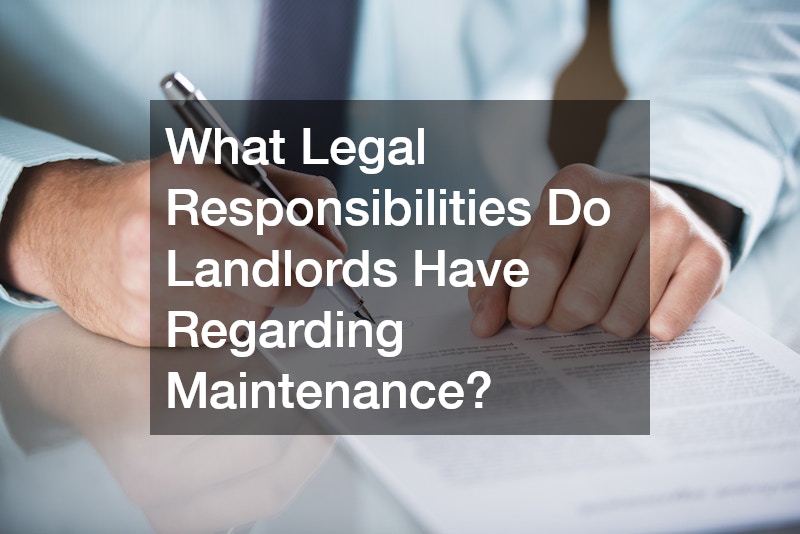Understanding general maintenance services is essential for landlords seeking to protect their investment and keep tenants satisfied. A well-maintained rental property not only enhances curb appeal and functionality but also helps reduce tenant turnover and long-term repair costs. Whether it’s arranging plumbing repairs, addressing electrical issues, or working with a roofing company to prevent leaks, this guide offers a practical roadmap for landlords to manage their properties effectively.
What are the Essential Maintenance Services a Landlord Should Provide?

Routine Inspections and Repairs
Every landlord should implement a proactive inspection schedule to identify and address small issues before they become major headaches. Regular property walk-throughs can uncover signs of deterioration, like loose fencing panels or water stains that suggest a leak. These routine inspections offer a chance to assess interior elements, including flooring, lighting, and window treatments. Even ensuring that each drape for window coverage is clean and functional contributes to overall property presentation.
Working with professionals when necessary, such as a local roofer to inspect flashing and shingles, can ensure that wear and tear doesn’t evolve into costly emergencies. Consistent upkeep helps reduce tenant complaints and preserves the property’s value over time.
Plumbing and Electrical Maintenance
Functional plumbing and electrical systems are fundamental to tenant comfort and safety. Leaky faucets, outdated wiring, and poor drainage systems are not just annoyances—they can be hazards. Timely plumbing repairs should always be a top priority. For serious issues like burst pipes, landlords should have a reliable emergency water repair contractor on call.
Similarly, electrical inspections ensure compliance with building codes and prevent fire hazards. It’s crucial to address these matters with licensed professionals and avoid DIY fixes that could violate safety regulations.
HVAC System Upkeep
Tenants expect reliable climate control, particularly during extreme weather. HVAC systems require regular inspections, filter replacements, and part replacements to function optimally. In some cases, full air conditioning installation might be necessary, especially in older buildings that previously relied on window units or outdated systems.
Preventative HVAC maintenance not only ensures tenant satisfaction but also reduces the long-term energy expenses for the property. A poorly functioning system can drive up utility bills, create comfort complaints, and wear down more rapidly under strain.
How to Create a Maintenance Schedule?
Identifying Seasonal Needs
Different seasons bring different maintenance challenges. Winter may involve adding blown in insulation to attics or walls to prevent heat loss and reduce utility bills. Spring and summer may focus on lawn care, pest control, and checking the integrity of roofing materials after winter storms. Roofs, siding, and gutters often take a beating during harsh seasons, and working with a reputable roofing company ensures they remain in top condition year-round.
A seasonal approach allows landlords to stay ahead of problems and maintain a sense of control over recurring tasks.
Prioritizing High-Risk Areas
Certain areas of a property are more vulnerable to damage than others. Bathrooms, kitchens, and entryways typically experience the most wear and tear due to high traffic and moisture exposure. In exterior spaces, fencing is often overlooked but should be regularly checked for damage from weather or rot.
Attending to these high-risk zones with frequent inspections and repairs can extend the property’s lifespan and minimize large-scale interventions down the line.
Utilizing Maintenance Management Software
Managing even one property can involve dozens of moving parts. Digital tools are indispensable for tracking tenant complaints, scheduling repairs, logging service requests, and maintaining records of completed tasks. Many modern landlord insurance service providers also offer portals or integrations that help landlords track repair claims or property damage.
This level of organization simplifies compliance with regulations and boosts tenant satisfaction by ensuring swift and transparent issue resolution.
How Can a Landlord Handle Emergency Repairs?
Establishing a 24/7 Helpline
Emergencies don’t keep regular business hours. A flooded basement or a broken heater during a cold front can’t wait until Monday. Establishing a 24/7 helpline—or contracting a property management service that offers one—is crucial for prompt response to crises. This system ensures that tenants feel heard and that emergency services, such as emergency water repair or urgent electrical fixes, are dispatched quickly.
Building a Network of Reliable Contractors
A well-vetted contractor network allows landlords to respond to emergencies efficiently. This network should include a roofing company for storm damage, a plumber for broken pipes, an electrician for power issues, and garbage hauling services to manage post-repair debris.
Establishing these relationships in advance allows landlords to act swiftly rather than scramble to find help when it’s already too late.
Preparing an Emergency Fund
No matter how diligent a landlord is, unexpected issues will arise. Having an emergency fund dedicated specifically to property repair and maintenance expenses ensures that emergencies can be handled without tapping into personal or operational savings. Ideally, this fund should be able to cover major incidents, such as structural damage, HVAC replacement, or unexpected fencing repairs.
How Often Should Inspections Be Conducted?

Pre-Tenancy and Move-Out Inspections
A documented walk-through before and after each tenancy helps determine if damage has occurred and sets the standard for property care. It also provides an opportunity to ensure that every aspect of the property, such as fixtures, appliances, and window coverings like each drape for window units—are functioning as expected.
Clear, written records help protect both parties in the event of a dispute over the security deposit or repair responsibilities.
Annual and Bi-Annual Inspections
Scheduling more comprehensive inspections annually or bi-annually allows for preventive maintenance and thorough review. This includes checking for blown in insulation effectiveness, roof integrity, drainage systems, and HVAC performance. Involving a local roofer for these checks ensures that critical external elements are properly maintained.
These visits also give landlords a chance to identify and resolve issues that tenants may not have reported.
Spot Checks and Compliance
Unannounced spot checks should always comply with local laws, but when done appropriately, they help identify issues such as unauthorized pets, unreported damage, or code violations. For legal matters—especially if a violation is discovered—consulting a real estate lawyer is essential. Their guidance helps landlords avoid fines and ensures tenant rights are upheld.
What Are the Common Maintenance Problems in Rental Properties?
Water Damage and Mold
Leaks from roofing, windows, or plumbing can lead to costly repairs and health hazards. Mold is particularly concerning, as it not only affects indoor air quality but can also lead to legal challenges if tenants become ill. Regular roofing inspections and timely emergency water repair can prevent these issues from worsening.
Pest Control Issues
Rodents, termites, and cockroaches can wreak havoc on rental properties. Moist environments, improperly sealed openings, or neglected garbage hauling services often contribute to infestations. Addressing these problems early, along with routine pest control, keeps properties sanitary and habitable.
Structural Wear and Tear
Time and usage naturally degrade structural elements like walls, floors, and fencing. Cracked walls, worn carpet, and sagging doors should not be ignored. Addressing these issues quickly prevents them from escalating into more severe—and expensive—problems.
How to Manage Maintenance Costs Effectively?
Budgeting and Financial Planning
Smart budgeting is a cornerstone of successful property management. Creating a detailed financial plan that includes line items for maintenance, unexpected repairs, upgrades, and service contracts helps landlords stay financially agile.
Many landlord insurance service policies can assist with covering repair costs from weather events, plumbing failures, or tenant-related damages. Reviewing these policies annually ensures adequate coverage.
Cost-Effective Repair Strategies
Not all problems require expensive fixes. Choosing cost-effective strategies—like using garbage hauling services to clean renovation debris instead of paying premium contractor cleanup rates—can keep budgets under control. Partnering with wholesale suppliers or reusing quality materials where appropriate are also excellent ways to cut down on repair costs without sacrificing quality.
Considering Preventative Measures
Preventative maintenance is less expensive than reactive repair. Applying weatherproofing, regularly sealing driveways, installing blown in insulation, and upgrading aging HVAC systems proactively avoids emergency breakdowns. These practices also improve energy efficiency and reduce long-term wear.
What Legal Responsibilities Do Landlords Have Regarding Maintenance?

Understanding Federal and State Regulations
Landlords must comply with a mix of local, state, and federal housing laws. These include building codes, habitability standards, lead disclosure rules, and fair housing regulations. Staying informed about changing laws is critical to avoid costly violations.
Working closely with a real estate lawyer can help landlords navigate complex legal landscapes and remain compliant.
Tenant Rights and Landlord Obligations
Landlords are obligated to provide safe and habitable living conditions. Tenants have the right to live in a property that meets basic structural, electrical, plumbing, and climate control standards. Failing to meet these obligations can result in rent withholding, lawsuits, or fines.
Clear communication and documented repairs demonstrate a landlord’s commitment to legal compliance.
Handling Violations and Penalties
When violations do occur, prompt correction is key. Whether it’s updating insulation, scheduling air conditioning installation, or repairing faulty fencing, timely action can prevent further penalties and show good faith to regulatory bodies.
A real estate lawyer can be instrumental in resolving these issues, especially if tenant complaints escalate to legal proceedings.
How Does Preventative Maintenance Save Money in the Long Run?
Extending Appliance Lifespan
Preventative care—like cleaning dryer vents or descaling water heaters—can dramatically extend the life of expensive appliances. This reduces replacement frequency and supports operational budgets over time.
Regular HVAC servicing, for instance, helps avoid the cost of premature air conditioning installation.
Reducing Major Repair Incidents
By investing in routine inspections and maintenance, landlords reduce the frequency and severity of major repair events. Roof leaks caught early are less expensive than replacing an entire ceiling or removing mold. Using a trusted local roofer for regular checkups is a smart and simple way to catch issues before they become disasters.
Enhancing Property Value
Well-maintained properties command higher rents, attract better tenants, and sell faster when it’s time to divest. Simple upgrades—such as updated fencing, clean drapes for windows, and modern appliances—can significantly boost property value. Preventative maintenance ensures the property remains appealing and competitive in the market.
How to Communicate Maintenance Issues with Tenants?
Establishing Clear Communication Channels
Clear, easy-to-use communication channels empower tenants to report issues quickly. Whether it’s through a phone number, app, or web portal, tenants should know exactly how to reach their landlord when a problem arises.
These systems should also support documentation for future reference or insurance claims through a landlord insurance service.
Tenant Reporting Procedures
Landlords should set clear expectations about how and when to report different types of issues. Emergencies such as leaks or electrical faults should be reported immediately, while cosmetic concerns might be bundled into routine inspections.
Providing written guidance during lease signing helps avoid confusion later on.
Setting Expectations and Follow-Up
After a problem is reported, landlords should follow up with an estimated repair timeline. Keeping tenants informed not only reduces frustration but also demonstrates professionalism. Follow-up after repair completion also ensures satisfaction and encourages ongoing cooperation.
How to Decide Between DIY Repairs and Hiring Professional Services?

Assessing the Complexity of the Issue
Some maintenance tasks—like repainting a wall or re-caulking a tub—are simple enough for DIY. However, complex repairs involving roofing, electrical wiring, or blown in insulation installations should always be handled by professionals for safety and legal compliance.
Calculating Cost-Benefits
Though DIY might seem cheaper upfront, improper repairs can result in higher costs later. Hiring a local roofer for a patch job done right the first time may be more economical than attempting a fix that later requires full replacement.
Evaluating Time and Skill Resources
Time is money. For landlords with multiple units or full-time jobs, outsourcing tasks like garbage hauling services or air conditioning installation may be the only practical option. Evaluating your available time and skills will help determine when to delegate.
Final Thoughts
General maintenance is more than a to-do list—it’s a critical aspect of property ownership that affects safety, value, and tenant satisfaction. Landlords who adopt proactive strategies, understand their legal responsibilities, and build strong relationships with contractors and tenants can effectively manage maintenance with confidence.
By integrating regular inspections, professional services, and digital tools, landlords can maintain rental properties that are both safe and desirable. In the long run, these efforts not only protect physical investments but also build a reputation for reliability and excellence.



